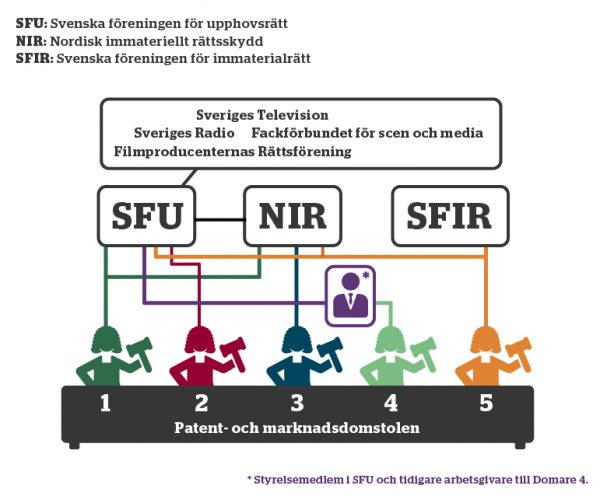ISP Questions Impartiality of Judges in Copyright Troll Cases
 Following in the footsteps of similar operations around the world, two years ago the copyright trolling movement landed on Swedish shores.
Following in the footsteps of similar operations around the world, two years ago the copyright trolling movement landed on Swedish shores.
The pattern was a familiar one, with trolls harvesting IP addresses from BitTorrent swarms and tracing them back to Internet service providers. Then, after presenting evidence to a judge, the trolls obtained orders that compelled ISPs to hand over their customers’ details. From there, the trolls demanded cash payments to make supposed lawsuits disappear.
It’s a controversial business model that rarely receives outside praise. Many ISPs have tried to slow down the flood but most eventually grow tired of battling to protect their customers. The same cannot be said of Swedish ISP Bahnhof.
The ISP, which is also a strong defender of privacy, has become known for fighting back against copyright trolls. Indeed, to thwart them at the very first step, the company deletes IP address logs after just 24 hours, which prevents its customers from being targeted.
Bahnhof says that the copyright business appeared “dirty and corrupt” right from the get go, so it now operates Utpressningskollen.se, a web portal where the ISP publishes data on Swedish legal cases in which copyright owners demand customer data from ISPs through the Patent and Market Courts.
Over the past two years, Bahnhof says it has documented 76 cases of which six are still ongoing, 11 have been waived and a majority 59 have been decided in favor of mainly movie companies. Bahnhof says that when it discovered that 59 out of the 76 cases benefited one party, it felt a need to investigate.
In a detailed report compiled by Bahnhof Communicator Carolina Lindahl and sent to TF, the ISP reveals that it examined the individual decision-makers in the cases before the Courts and found five judges with “questionable impartiality.”
“One of the judges, we can call them Judge 1, has closed 12 of the cases, of which two have been waived and the other 10 have benefitted the copyright owner, mostly movie companies,” Lindahl notes.
“Judge 1 apparently has written several articles in the magazine NIR – Nordiskt Immateriellt Rättsskydd (Nordic Intellectual Property Protection) – which is mainly supported by Svenska Föreningen för Upphovsrätt, the Swedish Association for Copyright (SFU).
“SFU is a member-financed group centered around copyright that publishes articles, hands out scholarships, arranges symposiums, etc. On their website they have a public calendar where Judge 1 appears regularly.”
Bahnhof says that the financiers of the SFU are Sveriges Television AB (Sweden’s national public TV broadcaster), Filmproducenternas Rättsförening (a legally-oriented association for filmproducers), BMG Chrysalis Scandinavia (a media giant) and Fackförbundet för Film och Mediabranschen (a union for the movie and media industry).
“This means that Judge 1 is involved in a copyright association sponsored by the film and media industry, while also judging in copyright cases with the film industry as one of the parties,” the ISP says.
Bahnhof’s also has criticism for Judge 2, who participated as an event speaker for the Swedish Association for Copyright, and Judge 3 who has written for the SFU-supported magazine NIR. According to Lindahl, Judge 4 worked for a bureau that is partly owned by a board member of SFU, who also defended media companies in a “high-profile” Swedish piracy case.
That leaves Judge 5, who handled 10 of the copyright troll cases documented by Bahnhof, waiving one and deciding the remaining nine in favor of a movie company plaintiff.
“Judge 5 has been questioned before and even been accused of bias while judging a high-profile piracy case almost ten years ago. The accusations of bias were motivated by the judge’s membership of SFU and the Swedish Association for Intellectual Property Rights (SFIR), an association with several important individuals of the Swedish copyright community as members, who all defend, represent, or sympathize with the media industry,” Lindahl says.
Bahnhof hasn’t named any of the judges nor has it provided additional details on the “high-profile” case. However, anyone who remembers the infamous trial of ‘The Pirate Bay Four’ a decade ago might recall complaints from the defense (1,2,3) that several judges involved in the case were members of pro-copyright groups.
While there were plenty of calls to consider them biased, in May 2010 the Supreme Court ruled otherwise, a fact Bahnhof recognizes.
“Judge 5 was never sentenced for bias by the court, but regardless of the court’s decision this is still a judge who shares values and has personal connections with [the media industry], and as if that weren’t enough, the judge has induced an additional financial aspect by participating in events paid for by said party,” Lindahl writes.
“The judge has parties and interest holders in their personal network, a private engagement in the subject and a financial connection to one party – textbook characteristics of bias which would make anyone suspicious.”

The ISP notes that all five judges have connections to the media industry in the cases they judge, which isn’t a great starting point for returning “objective and impartial” results. In its summary, however, the ISP is scathing of the overall system, one in which court cases “almost looked rigged” and appear to be decided in favor of the movie company even before reaching court.
In general, however, Bahnhof says that the processes show a lack of individual attention, such as the court blindly accepting questionable IP address evidence supplied by infamous anti-piracy outfit MaverickEye.
“The court never bothers to control the media company’s only evidence (lists generated by MaverickMonitor, which has proven to be an unreliable software), the court documents contain several typos of varying severity, and the same standard texts are reused in several different cases,” the ISP says.
“The court documents show a lack of care and control, something that can easily be taken advantage of by individuals with shady motives. The findings and discoveries of this investigation are strengthened by the pure numbers mentioned in the beginning which clearly show how one party almost always wins.
“If this is caused by bias, cheating, partiality, bribes, political agenda, conspiracy or pure coincidence we can’t say for sure, but the fact that this process has mainly generated money for the film industry, while citizens have been robbed of their personal integrity and legal certainty, indicates what forces lie behind this machinery,” Bahnhof’s Lindahl concludes.
Buy a VPN stay safe online
IPV-ISP Tracking-728×90
Thank you to the original source https://torrentfreak.com/isp-questions-impartiality-of-judges-in-copyright-troll-cases-180602/




